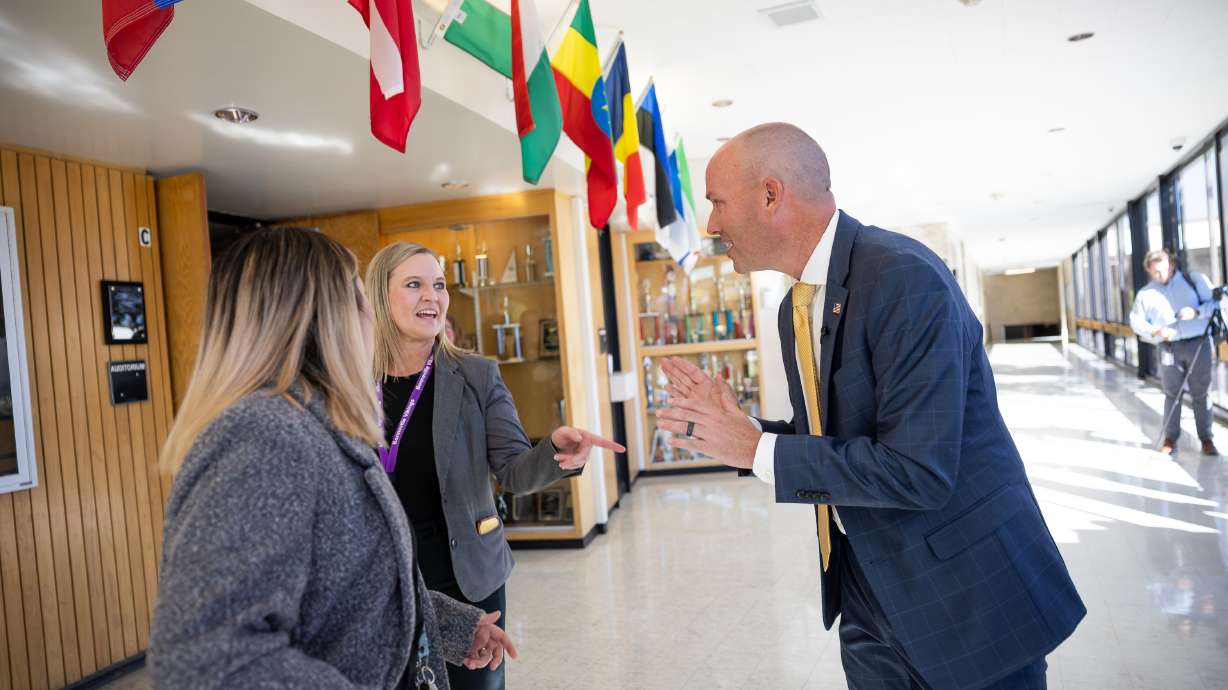Estimated read time: 4-5 minutes
This archived news story is available only for your personal, non-commercial use. Information in the story may be outdated or superseded by additional information. Reading or replaying the story in its archived form does not constitute a republication of the story.
HOLLADAY — Utah Gov. Spencer Cox on Monday said that he believes social media is negatively impacting the mental health, social connection and emotional well-being of Utah teens.
"Increasingly, kids and adults are turning to social media for connections. We don't spend as much time with our families and churches and schools and community groups. We become starved for this in-person connection," Cox told a crowd of parents, teachers and community leaders gathered at Bonneville Jr. High School.
Watch live https://t.co/yhGdUNNmsf
— Utah Gov. Spencer J. Cox (@GovCox) October 17, 2022
While he acknowledged that social media has its benefits — like helping people reconnect with old friends, and stay closer to loved ones who may live far away — it is the lack of in-person connection that can be eroded by overusing social media that is a concern to Cox.
A 2018 Pew Research Center survey of nearly 750 13- to 17-year-olds found that 45% are online almost constantly and 97% use a social media platform, such as YouTube, Facebook, Instagram or Snapchat.
"I say it all the time: I believe we are wired for connection and as a result of disconnection or the wrong connections, we're seeing that mental health is taking a beating," Cox said.
Along with high usage among teen populations, there is also data linking that use to declining mental health.
According to the Mayo Clinic, a 2016 study of more than 450 teens found that greater social media use, nighttime social media use and emotional investment in social media — such as feeling upset when prevented from logging on — were each linked with worse sleep quality and higher levels of anxiety and depression.
"I know that every generation, probably in the history of the world, has believed that the next thing is ruining our kids. I have to think that somewhere back there, when the plow was invented, there were some parents saying, 'This is going to ruin our kids," Cox joked.
"I do think we have to admit ... social media is very different than every other form of media we've had in the past, in that it is not passive, it is active," he said.

So, what can or should be done to address the harm social media is doling out to teenage brains?
Cox said he's calling on Utahns to join him in supporting "commonsense solutions," to protect the mental health of the state's young people.
The first of these solutions?
Getting cellphones out of classrooms, Cox said.
"What would the school environment look like if our students didn't have access to TikTok and YouTube for several hours during the school day? What would it feel like if teachers didn't have to compete with that immediate gratification of Instagram or Twitter for student attention?" Cox asked.
He added that he'd like to see school districts across the state pilot programs that remove cellphones from the classroom.

Along with decreasing the presence of phones in schools, Cox also said that there need to be laws that enable parents to be more involved in setting boundaries for their children on social media and that he's looking at such laws with legislators right now, assessing what potential legislation could look like for the 2023 legislative session.
"We want to give parents the ability to decide if and when your child is ready for social media by requiring parental permission in the creation of accounts for minors. There needs to be an easier way for parents to control how much of their time they can spend on social media and when it should be shut down," Cox said. "We really need social media companies to make it easier for parents to get and be involved in their child's access to social media, rather than just focusing on getting them hooked."
Cox also called for parents to help in other ways, citing a study from Brigham Young University's Wheatley Institution that shows the time a parent spends on social media is also a significant factor in their child's mental health.
"Our children and teenagers are growing up in homes where they feel like they have to compete with Instagram or Facebook or Twitter for their parent's attention," Cox said. "Let's reconnect through in-person activities and let's work together to improve the mental health of our children. Our families are certainly worth the investment."










